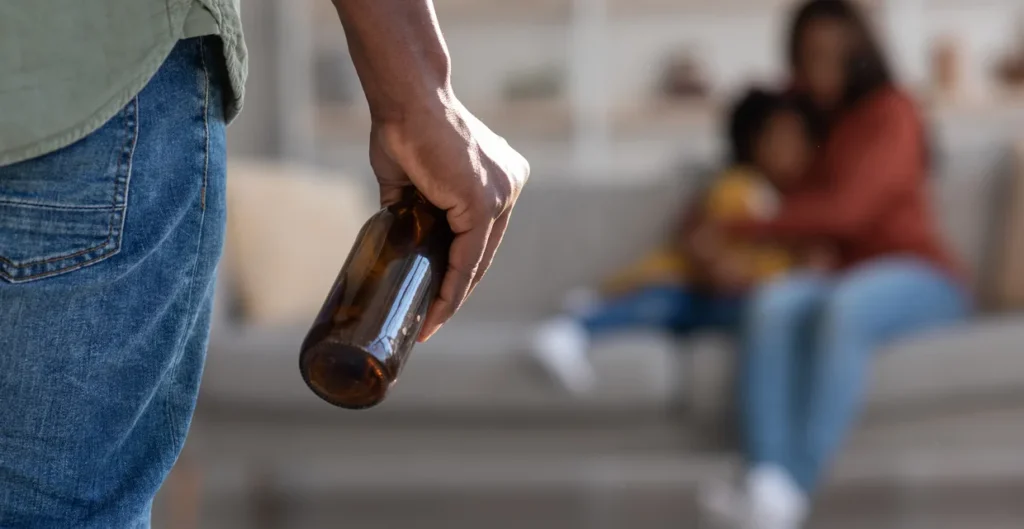Have you ever wondered why your spouse turns mean or abusive after a few drinks? It’s a situation many find baffling and distressing, especially when it affects relationships and social interactions. The link between alcohol and verbal abuse is not only concerning but also deeply hurtful for those on the receiving end.
Therefore, in this blog, we’re going to explore why alcohol can make some individuals become aggressive or abusive.
We’ll look at how drinking affects the brain and discuss what makes some people prone to this behavior. Plus, we’ll share some practical tips on how to handle these difficult moments. Whether you’re trying to understand a loved one’s challenging behaviors or seeking ways to manage your own, this guide will help you! So, let’s dive in!
Contents
Understanding the Impact of Alcohol on Behavior
 Alcohol can significantly change how the brain works, often leading to behavior that’s out of character, such as aggression or verbal abuse. Let’s break down how alcohol affects behavior:
Alcohol can significantly change how the brain works, often leading to behavior that’s out of character, such as aggression or verbal abuse. Let’s break down how alcohol affects behavior:
How Alcohol Influences the Brain:
- Lowered Inhibitions: Alcohol slows down brain activity, making people less cautious and more likely to act without thinking. This can result in saying or doing things they wouldn’t normally consider when sober.
- Impaired Judgment: Drinking affects parts of the brain responsible for decision-making and impulse control. This can lead to poor decisions and increase the likelihood of aggressive behavior.
- Mood Changes: Alcohol alters levels of chemicals in the brain that regulate mood, which can make emotions more intense and lead to overreactions during what might seem like normal interactions.
Why It Leads to Aggression:
- Quick to Anger: The emotional highs and lows caused by alcohol can make someone quick to anger and more likely to lash out.
- Feeling Threatened: Alcohol can make people more sensitive to perceived threats, increasing the chance they’ll respond aggressively.
- Background Factors: Those who have shown aggressive tendencies in the past or are in stressful life situations may be more likely to behave violently when drinking.
Understanding these effects of alcohol can help us recognize when someone might be at risk of becoming abusive and take steps to manage the situation safely.
Factors Influencing Abusive Behavior in Drunk Individuals
 Several factors can influence how individuals behave when they consume alcohol, particularly concerning abusive behavior. Here are key factors to consider:
Several factors can influence how individuals behave when they consume alcohol, particularly concerning abusive behavior. Here are key factors to consider:
- personal or family history of aggressive behavior or violence
- mental health conditions like depression, bipolar disorder, and particularly personality disorders
- growing up or living in environments where alcohol abuse and aggression are common can normalize these behaviors
- genetic predispositions
- stress Levels
- provocative behavior by others
- peer encouragement of aggressive acts
- consumption in settings where aggressive behavior is expected
- amount and speed of alcohol consumption
Recognizing these factors can help in predicting and managing potential aggressive behavior in individuals when they are drinking, aiding in preventative strategies and interventions.
Signs of Alcohol-Induced Aggression
 Recognizing the warning signs of alcohol-induced aggression can help in intervening before situations escalate. Here are some key indicators to watch for:
Recognizing the warning signs of alcohol-induced aggression can help in intervening before situations escalate. Here are some key indicators to watch for:
- sudden mood swings
- increased loudness or belligerence
- aggressive body language such as clenching fists, puffing up the chest, or getting into others’ personal space.
- verbal threats
- destruction of property
- physical violence
- reduced response to pain
- heightened reactivity
Identifying these signs early can be crucial for safely managing alcohol-related situations involving potential aggression.
Managing and Preventing Aggressive Behavior When Drinking

Managing and preventing aggressive behavior when alcohol is involved requires proactive strategies and awareness from both the drinker and their loved ones. Here are effective approaches to help keep situations under control:
- Decide in advance how many drinks will be consumed and stick to that limit.
- Recognize the situations, environments, or emotions that typically lead to aggressive behavior when drinking.
- Avoid these triggers, or plan strategies to cope with them without resorting to aggression.
- Drink slowly and choose lower alcohol options
- Eat before and during drinking to prevent spikes in intoxication that lead to loss of control
- Engage in stress-reduction practices like deep breathing, meditation, or walking away from stressful situations to manage emotions effectively.
- Agree on a word or signal with friends or family which means your behavior is getting out of hand. This can be your cue to take a break or stop drinking.
- Stay hydrated
- Consider seeking help from a mental health professional or a specialist in substance abuse and addiction. Therapy, counseling, and sometimes medication can help address underlying issues and teach more effective coping strategies.
By implementing these strategies, individuals and their loved ones can better manage and prevent aggressive behaviors associated with drinking, contributing to safer and more enjoyable social experiences.
Get Help for Alcohol Abuse
Dealing with alcohol abuse, whether it’s your own battle or you’re watching a loved one struggle, can be deeply challenging. It’s important to know that help is available and recovery is possible with the right support and resources.
If you or someone you care about is ready to take the next step toward overcoming alcohol abuse, consider booking a trial session with QuitMantra.
QuitMantra is a virtual clinic designed to offer personalized support for those looking to address alcohol abuse. Whether you aim to reduce your alcohol intake, quit altogether, or find ways to manage addiction effectively, QuitMantra provides tailored programs that cater to individual needs.
Visit QuitMantra today to learn more!
FAQs
- Are alcoholics more likely to be abusers? Alcoholism does not inherently make someone an abuser; however, there is a correlation between alcohol abuse and aggressive or abusive behavior. Alcohol impairs judgment, lowers inhibitions, and can increase impulsivity, which might lead to abusive behavior in some individuals, especially those with previous tendencies towards aggression or a history of violence.
- Can alcohol cause multiple personalities? Alcohol does not cause multiple personalities in the clinical sense of Dissociative Identity Disorder (DID). However, alcohol can significantly alter a person’s behavior and mood. People might seem very different from their sober self when under the influence, which can sometimes be mistaken for different personalities, but this change is due to the effects of alcohol on brain function, not actual multiple personalities.
- Do angry drunks mean what they say? Alcohol can reduce a person’s ability to filter thoughts and emotions, often leading to exaggerated expressions of feelings. While a person might express thoughts and feelings that are suppressed when sober, this doesn’t necessarily mean they are genuine or well-considered. Alcohol-induced statements can be distorted versions of a person’s feelings and should not be taken as their true sentiments.
- Is it true- alcohol reveals your true feelings? It’s a common belief that alcohol reveals true feelings, but this is a simplification. While alcohol can lower inhibitions and lead to more spontaneous expressions, it also impairs judgment and critical thinking. As a result, what is said or done under the influence of alcohol may be an exaggerated or altered expression of one’s sober feelings, heavily influenced by the disinhibiting effects of alcohol. Thus, these expressions are not always an accurate reflection of one’s true emotions or intentions.
